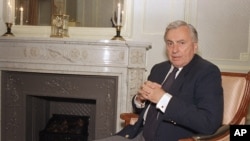American writer Gore Vidal, who chronicled the political and cultural landscape of the United States in historical and contemporary novels, essays and plays, has died at the age of 86.
Vidal's nephew says the writer passed away at his Los Angeles home Tuesday due to complications from pneumonia.
Vidal was born in 1925 in West Point, New York, where his father taught aviation at the U.S. Military Academy and eventually became director of air commerce under President Franklin D. Roosevelt. The younger Vidal spent much of his childhood living with his maternal grandfather, a prominent U.S. senator, and harbored early aspirations for a political career.
But he turned to writing while serving on a freight supply ship in Alaska's Aleutian Islands as a member of the U.S. Army during World War II. He published his first novel in 1946. But it was his third book, 1948's "The City and the Pillar," which portrayed an athletic young man who gradually discovers he is homosexual (based on Vidal's relationship with a teenage schoolmate), that brought Vidal his first brush with controversy.
Ignored by literary critics, he turned to writing scripts for many of the live television dramas that were broadcast from New York during the 1950s. One of them, "Visit to a Small Planet," which satirized life in the U.S. during the "Cold War" with the former Soviet Union, was adapted into a successful Broadway play, and later a Hollywood movie starring comedian Jerry Lewis.
Vidal's most successful play, "The Best Man," a political drama about two rivals for their party's presidential nomination, debuted on Broadway in 1960. That same year, he launched an unsuccessful campaign for a seat in the House of Representatives. In 1982, he ran unsuccessfully for the Democratic Party's nomination for a U.S. Senate seat from California.
In the mid-1960s, Vidal began turning out a series of historical and contemporary novels that became bestsellers, including "Myra Breckenridge," "Lincoln," and "Burr." He earned notoriety and celebrity for his public feuds with contemporaries such as Norman Mailer, Truman Capote and William F. Buckley. He was also known for his huge ego: he once said "There is not one human problem that could not be solved if people would simply do as I advise."
Vidal also wrote numerous essays on the American political culture. A collection of those essays ("United States: Essays 1952-1992") won the prestigious National Book Award in 1993.
Vidal's nephew says the writer passed away at his Los Angeles home Tuesday due to complications from pneumonia.
Partial List of Gore Vidal's Popular Works
Some of Gore Vidal's better known works:- The City and the Pillar (1948, novel)
- Myra Breckinridge (1968, novel)
- Burr (1973, novel)
- 1876 (1976, novel)
- Lincoln (1984, novel)
- United States: Essays 1952-1992 (1993, essays)
- Palimpsest: A Memoir (1995, autobiography)
- Point to Point Navigation: A Memoir (2006, autobiography)
But he turned to writing while serving on a freight supply ship in Alaska's Aleutian Islands as a member of the U.S. Army during World War II. He published his first novel in 1946. But it was his third book, 1948's "The City and the Pillar," which portrayed an athletic young man who gradually discovers he is homosexual (based on Vidal's relationship with a teenage schoolmate), that brought Vidal his first brush with controversy.
Ignored by literary critics, he turned to writing scripts for many of the live television dramas that were broadcast from New York during the 1950s. One of them, "Visit to a Small Planet," which satirized life in the U.S. during the "Cold War" with the former Soviet Union, was adapted into a successful Broadway play, and later a Hollywood movie starring comedian Jerry Lewis.
Vidal's most successful play, "The Best Man," a political drama about two rivals for their party's presidential nomination, debuted on Broadway in 1960. That same year, he launched an unsuccessful campaign for a seat in the House of Representatives. In 1982, he ran unsuccessfully for the Democratic Party's nomination for a U.S. Senate seat from California.
In the mid-1960s, Vidal began turning out a series of historical and contemporary novels that became bestsellers, including "Myra Breckenridge," "Lincoln," and "Burr." He earned notoriety and celebrity for his public feuds with contemporaries such as Norman Mailer, Truman Capote and William F. Buckley. He was also known for his huge ego: he once said "There is not one human problem that could not be solved if people would simply do as I advise."
Vidal also wrote numerous essays on the American political culture. A collection of those essays ("United States: Essays 1952-1992") won the prestigious National Book Award in 1993.




